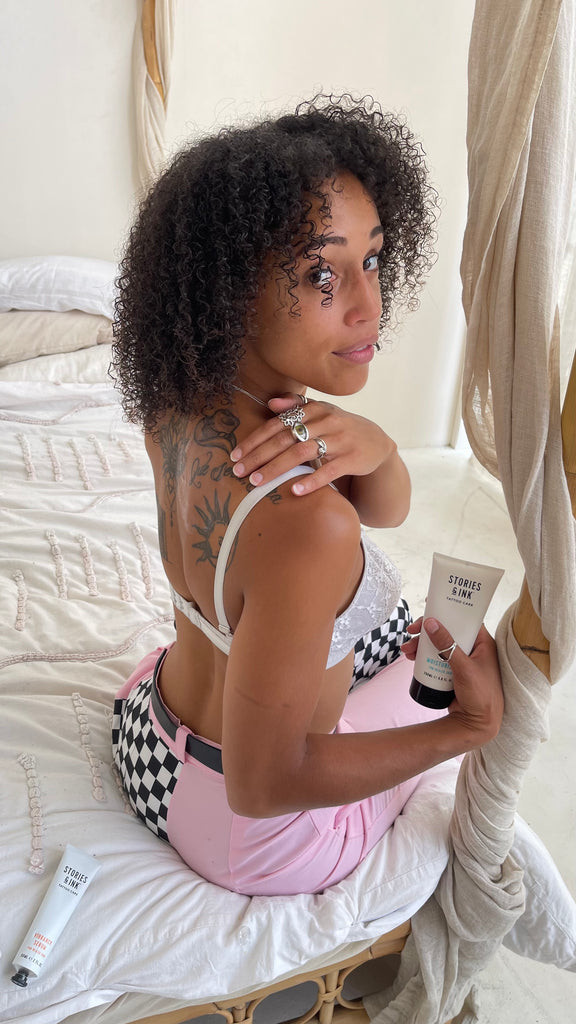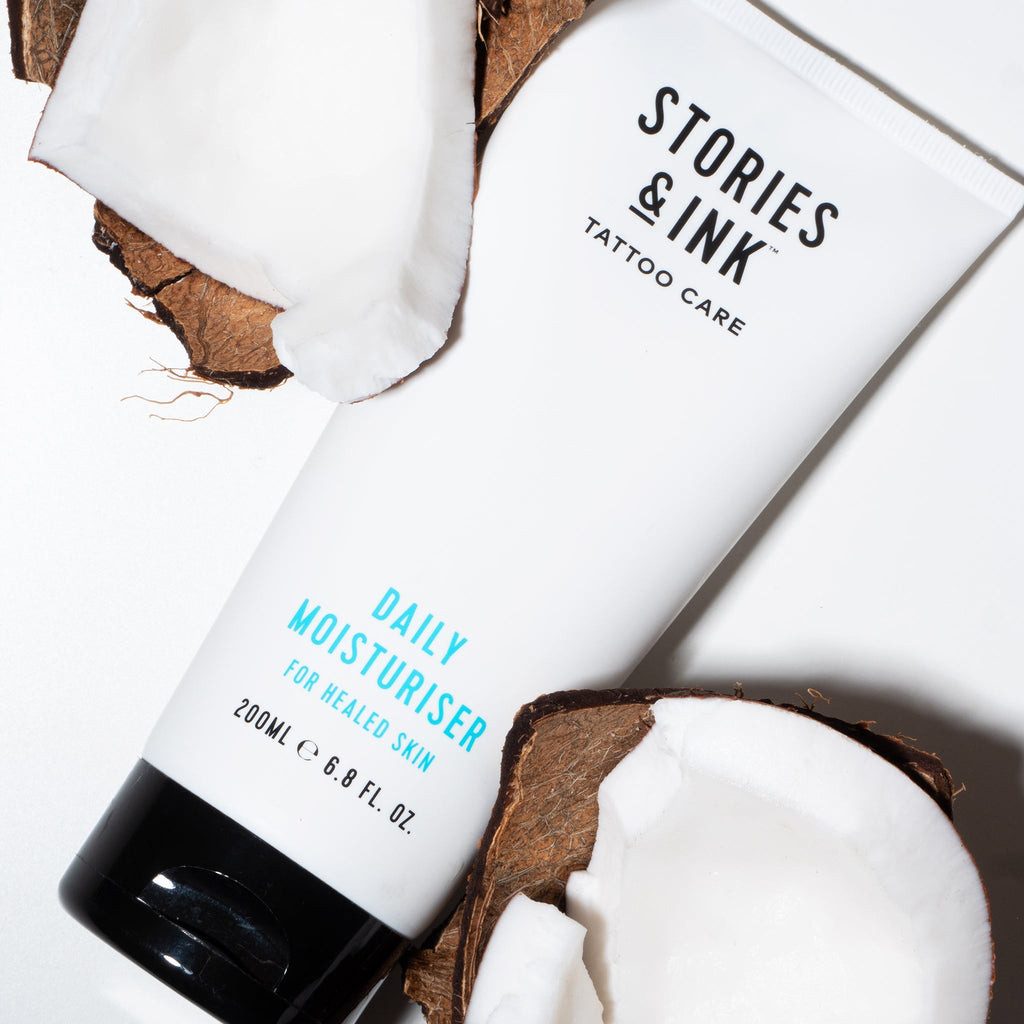Tattoo itching is a common concern, and understanding What Happens If You Itch A Tattoo is crucial for proper aftercare. At tattooat.com, we provide expert advice to ensure your tattoo heals beautifully. Learn about the risks of scratching, effective relief methods, and how to care for your ink. Discover essential tips and products to keep your tattoo looking vibrant and healthy with our in-depth guidance and curated resources.
1. Understanding Tattoo Itching
What is Tattoo Itching and Why Does It Happen?
Tattoo itching is the irritating desire to scratch or rub skin with fresh or old tattoo. The healing, immune responses and skin conditions are the main reason for itching. To soothe and properly care for your tattoo, choose tattooat.com, we provide the latest research and expert.
Several factors contribute to tattoo itching:
- Healing Process: The skin undergoes scabbing, peeling, and regeneration, leading to itching.
- Immune Response: The body’s reaction to tattoo ink causes histamine release, intensifying itchiness.
- Dryness: As the skin heals, it can become dry, leading to itchiness. Regular moisturizing helps prevent this.
- Allergic Reactions: Some individuals may experience allergic reactions to the tattoo ink or aftercare products, resulting in itching and redness.
- Skin Conditions: Pre-existing skin conditions like eczema or psoriasis can exacerbate itching in the tattooed area.
2. Timeline of Tattoo Itching
How Long Will Tattoo Itching Last and What to Expect?
The duration of tattoo itching varies, typically lasting one to three weeks. Individual healing processes differ, so some may experience shorter or longer periods. Itching intensity usually decreases as the tattoo heals. Factors like skin type, tattoo placement, and aftercare practices also affect the timeline.
| Stage | Duration | Characteristics |
|---|---|---|
| Initial Healing | 1-3 weeks | Scabbing, peeling, intense itching |
| Mid-Healing | 2-4 weeks | Reduced scabbing, less intense itching |
| Long-Term Care | Ongoing | Occasional itching due to dryness or environmental factors |
3. Identifying Potential Problems
Why is My Tattoo Itching and Raised: Recognizing Signs of Infection or Allergy?
If an old tattoo is itching and raised, it could signal an allergic reaction or infection. Allergies to ink or aftercare lotions cause itching and redness. Infections, while less common, lead to increased itching, swelling, and pus. Immediate consultation with a healthcare professional is crucial if you suspect an infection or severe allergic reaction.
Key signs to watch out for:
- Excessive Redness: More than normal redness around the tattoo area.
- Swelling: Significant swelling that doesn’t subside.
- Pus: Any discharge of pus from the tattoo.
- Fever: Elevated body temperature indicating an infection.
- Severe Itching: Intense, persistent itching that doesn’t respond to usual remedies.
 Woman with red itchy tattoo
Woman with red itchy tattoo
Woman experiencing redness and irritation around her newly tattooed arm, a sign of potential complications requiring attention and care.
4. Immediate Actions to Avoid
What Happens If I Scratch My Tattoo: Understanding the Risks and Consequences?
Scratching a tattoo introduces bacteria, increasing infection risk, causing scabbing, delaying healing, and affecting appearance. Resist the urge and follow aftercare guidelines. Scratching can lead to:
- Infection: Broken skin allows bacteria to enter, causing infections. Portland State University’s Art Department research in July 2025 shows infections can prolong healing by up to two weeks.
- Scarring: Disrupting the skin’s surface can lead to permanent scarring.
- Ink Loss: Scratching can pull out ink, causing fading and unevenness.
- Delayed Healing: Interfering with the natural healing process extends recovery time.
5. Safe Ways to Relieve Itching
How Do I Stop My Tattoo Itching: Effective Methods for Relief
To relieve itching on a new tattoo:
- Avoid Scratching: Pat or gently tap the itchy area.
- Keep the Area Clean: Wash gently with mild, fragrance-free soap and lukewarm water.
- Moisturize Regularly: Apply a thin layer of fragrance-free, hypoallergenic tattoo aftercare lotion.
- Use Cold Compresses: Apply a cold compress or ice pack wrapped in a clean cloth.
- Wear Loose Clothing: Minimize friction and irritation with loose, breathable clothing.
Here’s a more detailed look at each method:
- Patting: Gently patting the area can alleviate the itching without damaging the skin.
- Cold Compresses: Cold temperatures help numb the area and reduce inflammation, providing temporary relief.
- Moisturizing: Keeping the skin hydrated prevents dryness, which can exacerbate itching.
- Loose Clothing: Breathable fabrics prevent sweat and friction from irritating the tattoo.
6. Choosing the Right Products
What to Use on Your New Tattoo: Recommended Aftercare Products and Ingredients
Follow your tattoo artist’s aftercare instructions. Wash gently with mild soap, apply recommended aftercare lotion, and keep the area clean and moisturized. Look for products with:
- Fragrance-Free Formulas: To avoid irritation.
- Hypoallergenic Ingredients: To minimize allergic reactions.
- Moisturizing Agents: Like shea butter or cocoa butter.
Products to consider:
- Tattoo Aftercare Lotions: Specifically designed for tattoo healing.
- Fragrance-Free Soaps: Gentle cleansers to keep the area clean.
- Hypoallergenic Ointments: For extra moisture and protection.
7. Caring for Old Tattoos
What to Use on Old Tattoos: Maintaining Skin Health and Preventing Itching
Old tattoos may itch due to dryness or environmental reasons. Avoid harsh chemicals, consider antihistamines, protect from sun exposure, avoid scratching, and moisturize regularly.
Strategies for maintaining old tattoos:
- Hydration: Drink plenty of water to keep skin hydrated.
- Sun Protection: Use sunscreen to prevent fading and irritation.
- Regular Moisturizing: Apply lotion daily to combat dryness.
- Gentle Cleansing: Avoid harsh soaps that strip the skin of moisture.
8. Advanced Solutions
When to See a Doctor: Recognizing Signs of Infection or Allergic Reaction
Consult a healthcare professional if you experience signs of infection, severe allergic reaction, or persistent itching. Early intervention prevents complications.
Seek medical advice if you notice:
- Spreading Redness: Redness that extends beyond the tattoo area.
- Increased Pain: Severe or worsening pain.
- Foul Odor: An unpleasant smell emanating from the tattoo.
- Blisters: Formation of blisters around the tattoo.
9. Expert Insights
Insights From Tattoo Artists: Best Practices for Avoiding Itching
Tattoo artists recommend specific aftercare routines to minimize itching and promote optimal healing. Their expertise can guide you through the process.
Key recommendations from tattoo artists:
- Follow Instructions: Adhere to the aftercare advice provided by your artist.
- Avoid Sun Exposure: Protect the tattoo from direct sunlight.
- Stay Hydrated: Drink plenty of water to keep your skin healthy.
- Use Recommended Products: Only use aftercare products recommended by your artist.
10. Tattoo Aftercare Products
Tattoo Skincare Collection: Choosing the Right Products for Healing and Maintenance
Selecting the right tattoo skincare products ensures proper healing and long-term maintenance. Look for collections that offer gentle, effective solutions. Stories & Ink Daily Moisturizer keeps tattoos hydrated and suits all skin types.
Benefits of using specialized tattoo skincare:
- Faster Healing: Promotes quicker skin regeneration.
- Reduced Itching: Soothes and calms irritated skin.
- Vibrant Colors: Helps maintain the vibrancy of the tattoo ink.
- Long-Term Health: Keeps the skin healthy and moisturized.
 Stories & Ink Daily Moisturizer
Stories & Ink Daily Moisturizer
A close-up shot of Stories & Ink Daily Moisturizer, highlighting its smooth texture and the promise of keeping tattoos hydrated and skin healthy.
Understanding Tattoo Itching: FAQs
- Why is my new tattoo so itchy?
New tattoos itch due to the skin’s natural healing process, which includes scabbing, peeling, and regeneration. The body’s immune response to the ink also releases histamine, contributing to the itchiness. Keeping the area moisturized and avoiding scratching can help alleviate the discomfort. - Is it normal for old tattoos to itch?
Yes, old tattoos can itch due to dryness, changes in weather, or irritation from harsh chemicals. Regular moisturizing and avoiding potential allergens can help manage the itching. - What should I do if my tattoo is itching and raised?
If your tattoo is itching and raised, it could indicate an allergic reaction or infection. Consult a healthcare professional for proper diagnosis and treatment. - Can scratching a tattoo ruin it?
Yes, scratching a tattoo can introduce bacteria, increase the risk of infection, cause scarring, and delay the healing process. It can also affect the final appearance of your tattoo by causing ink loss. - What are the best products to use on a new tattoo?
For a new tattoo, use fragrance-free, hypoallergenic aftercare lotions or ointments recommended by your tattoo artist. Gentle, fragrance-free soaps are also ideal for keeping the area clean. - How often should I moisturize my tattoo?
Moisturize your tattoo regularly, typically 2-3 times a day, or whenever the skin feels dry. This helps keep the skin hydrated and reduces itchiness. - Can I use regular lotion on my tattoo?
It’s best to use lotions specifically designed for tattoo aftercare, as they are formulated to be gentle and non-irritating. Avoid lotions with fragrances, alcohol, or harsh chemicals. - What are some natural remedies for tattoo itching?
Natural remedies for tattoo itching include applying cold compresses, using aloe vera gel, or moisturizing with coconut oil. However, always consult with your tattoo artist or a healthcare professional before trying new remedies. - How can I protect my tattoo from sun exposure?
Protect your tattoo from sun exposure by wearing loose clothing or applying a broad-spectrum sunscreen with a high SPF. Sun exposure can cause dryness and further irritate the tattoo, leading to itching. - When should I see a doctor about my itchy tattoo?
See a doctor if you experience signs of infection, such as excessive redness, swelling, pus, fever, or severe itching that doesn’t respond to usual remedies. Early intervention can prevent complications.
At tattooat.com, we’re dedicated to providing you with the information and resources you need to care for your tattoos properly. From understanding the causes of itching to selecting the right products, we’re here to help you keep your ink looking its best.
Ready to explore stunning tattoo designs, find talented artists, and learn essential tattoo knowledge? Visit tattooat.com now and start your journey to perfect ink! Whether you’re looking for inspiration, expert advice, or the best aftercare products, tattooat.com is your ultimate resource for all things tattoos.
Address: 1825 SW Broadway, Portland, OR 97201, United States.
Phone: +1 (503) 725-3000.
Website: tattooat.com.
